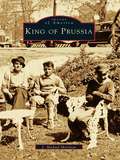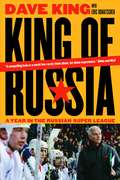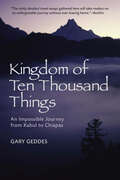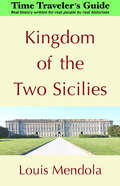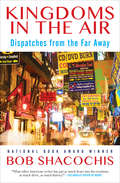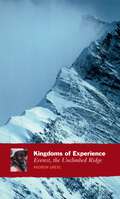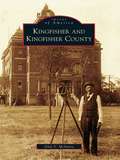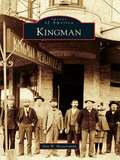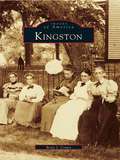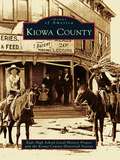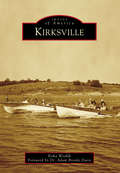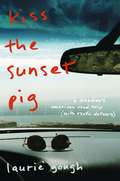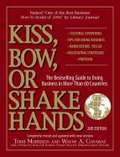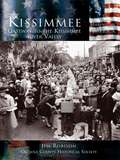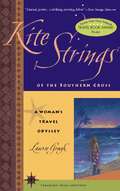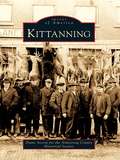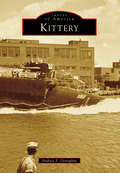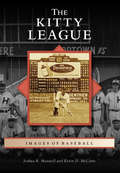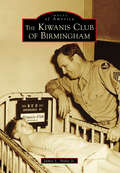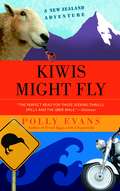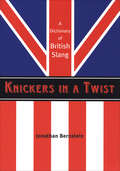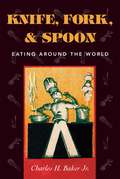- Table View
- List View
King of Prussia
by J. Michael MorrisonKing of Prussia hosts over 10 million visitors annually. This is quite a change from the little town once described as resembling an English hamlet. By 1762, King of Prussia had already become an area of strategic importance. Only a day's ride from Philadelphia, it was often used as a staging area for travelers heading west.
King of Russia: A Year in the Russian Super League
by Dave King Eric DuhatschekA revealing look inside the Russian Super League by its first Canadian coach. Until now no Canadian had penetrated the coaching ranks of Russian hockey, but the year after the NHL lockout, Dave King became head coach of the Metallurg Magnitogorsk. From the beginning, King, Canada’s long-time national coach and former coach of both the Flames and Blue Jackets, realized he was in for an adventure. His first meeting with team officials in a Vienna hotel lobby included six fast-talking Russians and the “bag-man” — assistant general manager Oleg Kuprianov, who always carried a little black bag full of U. S. one hundred dollar bills. The mission seemed simple enough: keep the old Soviet style combination play on offence, but improve the team’s defensive play — and win a Russian Super League Championship. Yet, as King’s diary of his time in Russia reveals, coaching an elite Russian team is anything but simple. King of Russiadetails the world of Russian hockey from the inside, intimately acquainting us with the lives of key players, owners, managers, and fans, while granting us a unique perspective on life in an industrial town in the new Russia. And introducing us to Evgeni Malkin, Magnitogorsk’s star and the NHL’s newest phenomenon. From the Hardcover edition.
Kingdom of Ten Thousand Things: An Impossible Journey from Kabul to Chiapas
by Gary GeddesFrom war-torn Afghanistan, through the snow-capped Himalayas and across the burning sands of the Taklamakan desert, to a rapidly modernizing China and on to the Central American jungles: it seems an impossible journey, but one that Gary Geddes eagerly undertook in order to retrace the voyage of the legendary 5th-century Buddhist monk Huishen. Geddes was long fascinated with stories of Huishen’s life and travels: this Afghan holy man fled Kabul for China and may have crossed the Pacific to North America 1,000 years before Columbus. The length and breadth of this expedition, and its difficulty, would have been amazing enough on its own, but Geddes’s trip takes on an added dimension and poignancy due to its timing: he reaches Afghanistan one month before September 11, 2001 and arrives in China as the tragic events unfold. Along the way, Geddes encounters Afghan refugees, Pakistani dissidents, Tibetan monks, Buddhist scholars, a KFC outlet in Luoyang, mysterious cairns in Haida Gwaii, and ghostly remains in Mexico. As the Silk Road morphs into superhighways, ancient sculptures turn into military targets, Geddes glimpses, in the collision of past and present history, important clues for imagining a workable future.
Kingdom of the Two Sicilies: The Time Traveler's Guide (The Time Traveler's Guide)
by Louis MendolaThis is a detailed guide to the kingdom that flourished in southern Italy from 1734 until its annexation to the unified Italy in 1861. As an introduction, it is an abridged edition of the author's print book of the same title, containing the complete main text but without the endnotes, bibliography or specialized appendices on topics such as orders of knighthood and titles of nobility. That volume is the first major history of the kingdom published in English.Encompassing Sicily and the Italian peninsula south of Rome, the Kingdom of the Two Sicilies was the wealthiest, most populous and most technologically advanced of the pre-unitary states of Italy. It is the region from which the greatest number of Italians emigrated after 1880 when, in the wake of the unification, its economy worsened.This book brings us the history of the place but also its people. Actual and virtual visitors will find it highly informative, full of details rarely published elsewhere. The author is an "insider" resident in the former kingdom, the land of his ancestors, a place he has studied for decades. This work reflects uncommon insight, correcting misperceptions by bringing us facts.
Kingdoms in the Air: Dispatches from the Far Away (Books That Changed the World)
by Bob ShacochisThis &“exuberant travel and cultural anthology&” by the National Book Award–winning author &“brings each setting to life with a perceptive eye&” (Booklist, starred review). Best known for his sweeping political novels, including the Pulitzer Prize finalist, The Woman Who Lost Her Soul, Bob Shacochis began his career as a journalist and contributing editor for Outside magazine and Harper&’s. Kingdoms in the Air brings together the very best of Shacochis&’s culture and travel essays in a collection that spans his global adventures and passions; from Kathmandu to Mozambique, from his love of surfing to his obsession with the South American dorado. In the titular essay &“Kingdoms,&” the longest work in the collection, Shacochis ventures to Nepal with his friend, the photographer Thomas Laird, who was the first foreigner to live in Nepal&’s Kingdom of Mustang as the forbidden Shangri-La prepared to open its borders to trekkers and trade. Replete with Shacochis&’s swagger, humor, and wisdom, Kingdoms in the Air is an essential collection of travel writing by an author who &“has extended his knowledge and imagination into places most of us have never ventured&” (Washington Post).
Kingdoms of Experience: Everest, the Unclimbed Ridge
by Andrew GreigA novice&’s tale of scaling Everest: &“Recommended for all armchair adventurers who have ever wondered what it would be like to climb in the Himalayas.&”—Geographical Magazine The last attempt to conquer Everest by the unclimbed northeast ridge had ended in failure and tragedy, with the deaths of two great climbers, Joe Tasker and Pete Boardman. Now, in March 1985, Mal Duff would lead a new expedition. Andrew Grieg and the others knew the risks as well as the excitement of the challenge—and in this extraordinary book, Greig chronicles not only the assault on the peak but also the complex relationships of nineteen very different personalities living together. &“Poet, novelist, and novice climber Greig's insightful account of the 1985 ascent of Everest's previously unclimbed northeast ridge provides an unusual perspective on the world of climbing. In comparison to many seasoned mountaineers, with their sometimes obsessive &‘diehard&’ drive, Greig possesses a refreshing sense of enthusiasm and innocence. His lack of experience allows him to describe with great intensity and detail the difficult tasks of climbing in a methodical step-by-step fashion, allowing readers to grasp the complex challenges. Greig is often able to step back and observe the goings-on, providing a detached analysis of the group and its dynamics. To complement his version of events, he also draws liberally from the diaries of the other participants. A unique addition to mountaineering literature with charming and distinct characteristics.&”—Library Journal
Kingfisher and Kingfisher County
by Glen V. McintyreKingfisher and Kingfisher County showcases images from a special time, 1889 to just before World War II, and special places, small towns on the edge of the Great Plains. Sometimes called "the Buckle of the Wheat Belt," the city of Kingfisher is the county seat and lies about 45 minutes northwest of Oklahoma City near the center of the state. Other towns, Hennessey, Loyal, Cashion, Dover, and Okarche, still exist and thrive, although many other small towns in the county are only memories. The eastern portion of the county was opened by the land run of 1889, and the western portion, originally part of the Cheyenne and Arapaho Reservation, was opened by the land run of 1892. The growth and harvesting of hard red winter wheat has long been central to the economy of the area. Photographs of Cheyenne Indians, floods, wheat harvesting, small-town stores, and the people of the area are only some of the materials that preserve showing the way life was in Kingfisher and Kingfisher County.
Kingman
by Dan W. MessersmithKingman, county seat of Mohave County in northwestern Arizona, owes its beginning and subsequent prosperity to the building of the Atlantic and Pacific Railroad in 1882. The city was named for the project's chief engineer, Lewis Kingman. The initial railroad siding quickly became a supply center for mining and ranching operations that dotted the beautiful surrounding valleys and mountain ranges. Through the years, Kingman has been at the crossroads of rail, highway, and air transportation routes. A B-17 bomber gunnery training base brought changes by exposing the area's potential to thousands of soldiers during World War II, many of whom would later return. Actor Andy Devine grew up here, Clark Gable and Carole Lombard were married here, and Charles Lindbergh would establish a route for Transcontinental Air Transport through here. Today Kingman is the "Heart of Historic U.S. Route 66" and is located in the middle of the longest remaining stretch of the "Mother Road," making it a must-see destination for thousands of tourists each year.
Kingston
by Betty J. CotterPerhaps no village in Rhode Island can boast the history of Kingston, or "Little Rest" as it was called. Once a seat of government (its library was one of Rhode Island's five state houses), Kingston has been home to some of the state's most illustrious residents as well as the now sprawling University of Rhode Island. A center of intellectual life long before the university began, Kingston was characterized by social, civic, and dramatic clubs, academies for both men and women, taverns for the weary traveler, and an imposing church atop Kingston Hill whose influence was felt broadly in the village.More than 200 photographs take the reader back tonineteenth-century Kingston, where Stephen Knowles waits atop his carriage to take travelers to Kingston Station, hat maker Cyrus French regales the menfolk in Joe Reynolds's tavern with his expansivestories, and the villagers gather on a summer evening to listen to a musicale on the library's lawn. Within Kingston's pages, the reader can meet people like Solomon Fayerweather, the village blacksmith and church sexton with a unique wisdom about village doings; and Quaker Billy Rose, whose fine weaving work was sought by the likes of Mrs.Theodore Roosevelt. See the familiar, Colonial-style houses that still line Kingstown Road as well as others that have fallen victim to the wrecking ball. Photographs of nearby "Biscuit City" and West Kingston are also included. These photographs, mostly from the collection of the Pettaquamscutt Historical Society, chronicle church, school, and business life in this picturesque village that has played such an important role in Rhode Island's history.
Kinky Gazpacho
by Lori TharpsMagazine writer and editor Lori Tharps was born and raised in the comfortable but mostly White suburbs of Milwaukee, Wisconsin, where she was often the only person of color in her school and neighborhood. At an early age, Lori decided that her destiny would be discovered in Spain. She didn't know anyone from Spain, had never visited the country, and hardly spoke the language. Still, she never faltered in her plans to escape to the Iberian Peninsula. Arriving in the country as an optimistic college student, however, Lori soon discovers Spain's particular attitude toward Blackness. She is chased down the street by the local schoolchildren and pointed at incessantly in public, and her innocent dreams of a place where race doesn't matter are shattered. The story would end there, except Lori meets and marries a Spaniard, and that's when her true Spanish adventure really begins. Against the ancient backdrops of Cádiz and Andalucía, Lori starts the intricate yet amusing journey of rekindling her love affair with Spain and becoming a part of her new Spanish family. From a grandmother who spies on her to a grandfather who warmly welcomes her to town with a slew of racist jokes, the close-knit clan isn't exactly waiting with open arms. Kinky Gazpacho tells the story of the redeeming power of love and finding self in the most unexpected places. At its heart, this is a love story. It is a memoir, a travel essay, and a glimpse into the past and present of Spain. As humorous and entertaining as such favorite travel stories as Under the Tuscan Sun, this book also unveils a unique and untold history of Spain's enduring connection to West Africa. Kinky Gazpacho celebrates the mysticism of travel and the joys of watching two distinct cultures connect and come together.
Kiowa County
by Kiowa County Historical Society Project, Eads High School Local HistoryCarved out of Bent County in 1889, Kiowa County is a rural, agricultural area with a rich and varied history. Located in southeastern Colorado in the heart of the Great Plains, Kiowa County was originally dominated by cattle ranches; however, farming quickly became just as important. The construction of the Missouri Pacific Railroad in the late 1880s sparked the growth of towns in Kiowa County, bringing a variety of ambitious settlers facing many challenges. Confronted with a well-documented drought cycle in the semiarid climate, the settlers persevered to establish schools and businesses and to create homes. Although Kiowa County never became home to a booming metropolis as early residents dreamed, the county's citizens take pride in a rich history and strive to preserve it.
Kirksville
by Erika WoehlkKirksville has made a name for itself with its two major institutions of higher education--Truman State University and A.T. Still University--that attract bright students from all over the world. Incorporated in 1857, it has grown to become the most populous city in northeast Missouri. As the seat of government for Adair County, the courthouse stands proudly in the center of the business square downtown. Entrepreneurs have benefited from railroad lines that entered the town in the 1870s, and many businesses have flourished in Kirksville as a result. Residents braved the tumultuous Civil War and rebuilt the town after major tornadoes and ice storms. Kirksville is a beautiful place to live, as exemplified by nearby Thousand Hills State Park. It is indeed the town "where people make the difference."
Kiss the Detective: A Lefty Mendieta Investigation (Book 4)
by Élmer MendozaAn intelligent, atmospheric police procedural series for fans of John Le Carré and Mick Heron"The most important thing that's happened in Mexican literature in the last thirty years" Gaby Wood, Sunday Telegraph.Detective Lefty Mendieta makes a deal with the devil in a gripping new novel from the Godfather of Narco Lit Short of leads on the execution-style murder of a fortune-teller, Detective Lefty Mendieta turns to his contacts in the drug underworld. They oblige, but there is a quid pro quo: Help Samantha Valdés, head of the Pacific Cartel, slip through the net of Mexican army and federal police encircling the hospital where she is recovering after an attempt on her life. Grudgingly he agrees, but then gets caught on camera during the escape and becomes headline news.Fired from the force and on the run from the Feds, Lefty again seeks Samantha's help when he learns that his son Jason has been kidnapped in Los Angeles. There, he must come to terms with the woman who broke his heart, while contending with a thicket of conspiracies, feints and double-crosses that further blur the distinction between crime and the law. Betrayal is certain. To save his son, who will Lefty sell out?Translated from the Spanish by Mark Fried
Kiss the Detective: A Lefty Mendieta Investigation (Book 4)
by Élmer MendozaAn intelligent, atmospheric police procedural series for fans of John Le Carré and Mick Heron"The most important thing that's happened in Mexican literature in the last thirty years" Gaby Wood, Sunday Telegraph.Detective Lefty Mendieta makes a deal with the devil in a gripping new novel from the Godfather of Narco Lit Short of leads on the execution-style murder of a fortune-teller, Detective Lefty Mendieta turns to his contacts in the drug underworld. They oblige, but there is a quid pro quo: Help Samantha Valdés, head of the Pacific Cartel, slip through the net of Mexican army and federal police encircling the hospital where she is recovering after an attempt on her life. Grudgingly he agrees, but then gets caught on camera during the escape and becomes headline news.Fired from the force and on the run from the Feds, Lefty again seeks Samantha's help when he learns that his son Jason has been kidnapped in Los Angeles. There, he must come to terms with the woman who broke his heart, while contending with a thicket of conspiracies, feints and double-crosses that further blur the distinction between crime and the law. Betrayal is certain. To save his son, who will Lefty sell out?Translated from the Spanish by Mark Fried
Kiss the Sunset Pig: A Canadian's American Road Trip With Exotic Detours
by Laurie GoughIn this lyrical, poetic, and charmingly funny book, Laurie Gough drives from Ontario to California reflecting on a life spent travelling in search of new experiences and familiar sensations. Heading towards a half-remembered cave on the Pacific coast where her younger, more adventurous self once stayed, she recalls adventures in Sumatra, the Yukon and many places in between--and wonders what compels her to keep moving through life while everyone else has found a place to belong.
Kiss, Bow, Or Shake Hands: The Bestselling Guide to Doing Business in More Than 60 Countries, Second Edition (Kiss, Bow Or Shake Hands Series)
by Terri Morrison Wayne A. ConawayThis is a guide to proper international business protocol. With countries such as China and India taking on a more significant role in the global business landscape, you can't afford not to know the practices, customs, and philosophies of other countries.
Kissimmee: Gateway to the Kissimmee River Valley
by Jim Robison Osceola County Historical SocietyKissimmee, Florida traces its name to the Jororo tribe, among the first to settle along the river valley. Riverboat captains, entrepreneurs, and speculators found Kissimmee and nearby Lake Tohopekaliga irresistible, and soon settlers followed. The 1880s marked this city's first brush with tourism, as the Tropical Hotel became the largest resort hotel south of Jacksonville. As the cattle town struggled to survive floods, the Depression, and downtown neglect in favor of spillover Walt Disney World business, committed citizens fought back and spiritedly rekindled the town into a favored tourist spot.
Kite Strings of the Southern Cross
by Laurie GoughA passionate journey of love, discovery, and serendipity radiating from a remote Fijian beach to the far reaches of the globe. Heartwarming, funny, and wise, Laurie Gough has written a profound testament to the invaluable lessons of the road.
Kittanning
by Diane Acerni Armstrong County Historical SocietyKittanning, a main street presence in rural Armstrong County, takes its name from the Delaware people who inhabited western Pennsylvania. Considered the site of a pivotal conflict during the French and Indian War, Kittanning later emerged as a center for local government and commerce. Families and businesses prospered by tapping into the Allegheny River and the wealth of other natural resources around them. The Allegheny was a lifeline, carrying valuable goods and materials as it twisted along its hilly southern path to the Ohio River. Among Kittanning's more notable exports were the visible print typewriter and the adventuress Nellie Bly. Kittanning showcases that while the faces and facades of this community have changed over the years, the town has stood the tests of time, largely due to the resourcefulness of its residents and their determination and dedication to preserve their riverside home.
Kittery (Images of America)
by Andrea F. DonaghueVery few towns in the United States have the honor of being the first one incorporated in their state. Kittery, incorporated in 1647, has that honor for the great state of Maine. For over 300 years, this small seaside town has not deviated far from its shipbuilding roots. Like many towns of its day, Kittery was founded by a few prominent families whose presence is visible to this day. The rich architecture created by these people, coupled with various intriguing stories of the area, makes for a fascinating visual tour of the past. Kittery's strong ties with shipbuilding are obvious, and the growth and development of the Portsmouth Naval Shipyard, the nation's oldest continuously operating shipyard, has created a strong foundation for the community. With ships comes the military, and its presence in Kittery is another contributing member to the town's history. From John Paul Jones to Teddy Roosevelt, the stories and memories of past military and military-related events are nothing short of incredible.
Kitty League (Images of Baseball)
by Joshua Maxwell Kevin D. MccannBetween 1903 and 1955, the Kentucky-Illinois-Tennessee League--better known as the "Kitty League"--brought minor-league baseball to fans throughout Kentucky, Tennessee, Illinois, and Indiana. Supporting teams with such colorful nicknames as the Hoppers, Oilers, Clothiers, Egyptians, and Miners, the league produced many great players, such as Tony Kubek, Chuck Tanner, and Don McMahon, who enjoyed solid major-league careers. It also produced future Hall of Famers Edd Roush and Red Schoendienst. The Kitty League also provided major-league veterans like Earl Browne, Hod Lisenbee, and Vito Tamulis the chance to keep playing the game they loved.
Kiwanis Club of Birmingham, The (Images of America)
by James L. Noles Jr.When founded in 1917, the Kiwanis Club of Birmingham, Alabama, embarked on a civic-minded journey that would take it through a century of service and tradition. The club’s membership rolls would ultimately boast some of the most distinguished leaders in Birmingham’s business community. At their weekly lunches, they would be entertained by both local and national speakers and visitors, ranging from Babe Ruth to Tom Brokaw. Equally importantly, the club’s tradition of generosity continues to resonate in Birmingham today as the club celebrates its centennial year in 2017. The club’s endeavors include commissioning a master urban parks plan for Birmingham in 1924, erecting the city’s iconic statue of Vulcan atop Red Mountain, funding the construction of Birmingham’s Boys Club, sponsoring professional football games at Birmingham’s historic Legion Field in the 1960s, and more recently, funding a $4-million project to enhance Vulcan, build the Kiwanis Centennial Park, and establish a key link in Birmingham’s Red Rock Ridge and Valley Trail System.
Kiwis Might Fly: A New Zealand Adventure
by Polly EvansNEW YORK TIMES BESTSELLERPolly Evans was a woman with a mission. Before the traditional New Zealand male hung up his sheep shears for good, Polly wanted to see this vanishing species with her own eyes. Venturing into the land of giant kauri trees and smaller kiwi birds, she explores the country once inhabited by fierce Maori who carved their enemies' bones into cutlery, bushwhacking pioneers, and gold miners who lit their pipes with banknotes--and comes face-to-face with their surprisingly tame descendants. So what had become of the mighty Kiwi warrior? As Polly tears through the countryside at seventy-five miles an hour, she attempts to solve this mystery while pub-crawling in Hokitika, scaling the Southern Alps, and enduring a hair-raising stay in a mining town where the earth has been known to swallow houses whole. And as she chronicles the thrills and travails of her extraordinary odyssey, Polly's search for the elusive Kiwi comes full circle--teaching her some hilarious and surprising lessons about motorcycles, modern civilization, and men.From the Trade Paperback edition.
Knickers in a Twist: A Dictionary of British Slang
by Jonathan BernsteinDon&’t play the silly bugger in front of your mates! Take a deep dive into British language and culture with this &“hilarious and entertaining&” reference (Chicago Tribune). Brits and Americans dress the same, eat at the same chain restaurants, and pass music back and forth across the Atlantic, and our national leaders are practically conjoined twins. But the second the Brits open their mouths, all bets are off. So don&’t dream of visiting the United Kingdom, dating a Brit, or truly understanding what Jude Law is saying without this handy, hilarious, and informative guide to Britspeak. With the cheekiness of Austin Powers and the tidbit quotient of Schott&’s Miscellany, screenwriter Jonathan Bernstein&’s collection of Cockney rhyming slang, insults culled from British television shows of yore, and regional and &“high British&” favorites provides hours of educational, enlightening, even life-saving hilarity. And if it doesn&’t accomplish that, at least you&’ll be aware that when a British citizen describes you as a &“wally,&” a &“herbert,&” a &“spanner,&” or a &“bampot,&” he&’s not showering you with compliments. Knickers in a Twist is as indispensable as a London city guide, as spot-on funny as an episode of The Office, and as edifying as Born to Kvetch and Eats, Shoots and Leaves. &“Indispensable.&” —Vanity Fair &“Will probably do more for revolutionizing the way you and your nearest and dearest address one another than any other book out this year . . . Often bring[s] an overt chuckle.&” —Edge New York
Knife, Fork and Spoon: Eating Around the World
by Charles H. Baker Jr.Long before Julia Child introduced French cooking to American palates, Charles Baker and The Derrydale Press published a highly unusual collection of recipes for its day: exotic recipes from around the world for unusual hors' d'oeuvres, soups, fish, shellfish, poultry, game, meat, vegetables, fruits and desserts. From avocado salad recipes discovered by the author in Cuba to grouse recipes from the Scottish moors, the author's tour de force belongs on the shelf of every serious cook.
